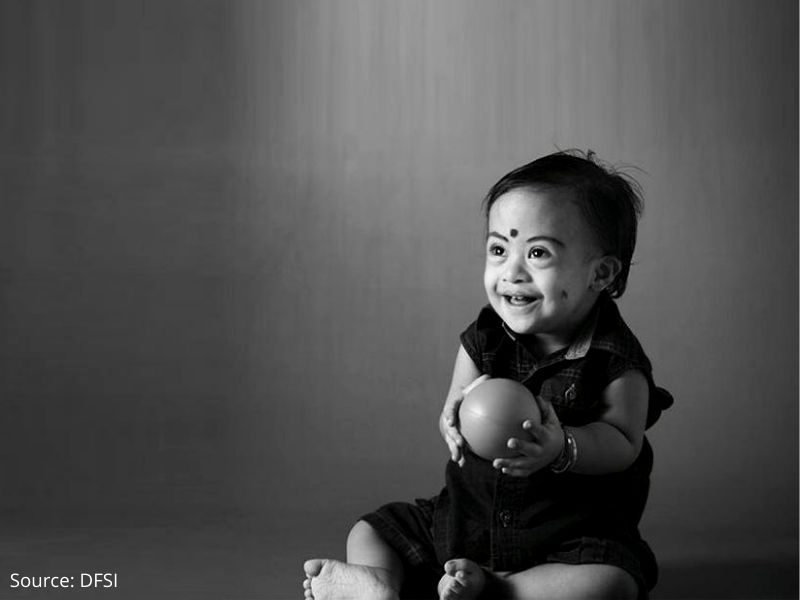Down syndrome occurs when an individual has an extra (partial or whole) copy of chromosome 21. In December 2011, the General Assembly declared March 21 as World Down Syndrome Day in order to raise public awareness about the condition. According to the United Nations, each year, approximately 3,000 to 5,000 children are born with this chromosome disorder.
The theme for this year’s World Down Syndrome Day 2020, focuses on “We Decide” signifying that “all people with Down syndrome should have full participation in decision making about matters relating to, or affecting, their lives.”
Dr. Rita James, director/coordinator of Asha Kiran Special Needs School, an inclusive set up for children with special needs including down syndrome says, “First thing we focus on is self-help training and communication skills as soon as a child enters the school. Then we find out the skills in which a child is good at and enjoys, with keen observation while the child is engaged in different activities. After discovering these skills, the same are sharpened with training. We also take parents through a six weeks course, “ Independent Living”.”
Children with down syndrome or any other disability have always faced challenges when it comes to inclusivity. James suggests ways to make a difference, “Throw away the pity mentality which we usually have towards individuals with special needs. We must treat them with due respect. They can be trained very well in repetitive tasks and are like a sponge which absorbs any liquid with no differentiation. Though they may not develop intellectually like a neuro typical individual, they do grow in all other areas of life.”
Sanchetna – Center for Children with Special Needs, Noida’s director Jasmine Gandhi says, “Sanchetna is committed towards inclusivity and takes all measures to empower students with special needs. Beginning with social inclusion the curriculum designed for Down syndrome students is customised keeping in mind their level of functioning and developing skills which are essential towards making them independent in activities of daily living. The focus of the institution is to explore possibilities with these students so that their limitations can be minimised. ”
“Inclusion has to be a way of life . While society is opening up to the idea of inclusion of children with special needs it is imperative that every institution works on creating this culture and climate by organising programmes involving regular children and those with special needs. This must be done at all levels and we at our institution practice by doing just the same. Every event of our institution aims at celebrating
“Parents of children with down syndrome must start early intervention which is the key to the overall management of the condition and independent functioning of the individual later in life. The parents in all their care and concern sometimes end up doing things for their children which actually handicaps them. We at our institution emphasise at facilitating the children by doing things with them rather than for them. This is extremely essential for their growth and development,” concludes Gandhi.
She believes one can improve the quality of life of people with down syndrome “by proper care and training. Down syndrome children needs holistic development program and moreover they need proper hygiene. Most of the children may have a condition of heart related diseases like congenital heart disease(CHD), the most common type of birth defect, can lead to other co- morbid conditions. But with proper care and training down syndrome children can lead a normal life.”
When it comes to academics she is quite good. By the age of 7, she could write alphabets and numericals. Visually also she is good – if you can show her any picture, she can recognise it. She is very good with speech as well. In terms of logical thinking – if I give her any instructions, she will follow. Socially, she is very accepted. Everyone loves her and gets attached to her. I consider Jeesha as normal as my younger daughter, Melisha. We have given her every kind of exposure – she learns dancing and swimming.”
She adds, “Besides, we also have a wonderful sports programme – the special Olympics programme and many of our down syndrome children have been able to participate in both national and international level. Last year one of our students participated in the swimming competition of the Special Olympics wherein she got the silver medal.”
Sanghvi also has a brother, Jesal (36) with Down syndrome who is an ex-student of SPJ Sadhana. She tells us, “It was challenge in the beginning but we gave him a lot of love and care. He also studied in a normal school till standard three where in attained mainstream education. He had to go through a lot of interventions and had an open heart surgery as lot of down syndrome people have congenital problems. Now he works in a sheltered workshop and is an extremely socialablee person.”
